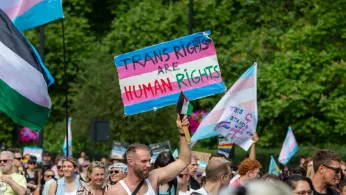
5 hours ago
UK Supreme Court Ruling Denies Gender Recognition to Trans Man Over Intention to Conceive
READ TIME: 3 MIN.
A transgender man residing in the United Kingdom has had his application for a Gender Recognition Certificate (GRC) denied, following a Supreme Court decision that strictly defines legal “sex” as biological sex assigned at birth. The panel reportedly cited the applicant’s intention to conceive as a decisive factor in their rejection, marking a significant moment in the evolving legal landscape for transgender rights in the UK .
Since the Gender Recognition Act of 2004, transgender individuals in the UK have been able to obtain a GRC, allowing them to have their gender identity legally recognized on important documents such as birth certificates and passports. The process has long been considered an essential step for affirming the identities of trans people and reducing barriers to accessing services and rights.
However, recent judicial interpretations have complicated this process. In April 2025, the UK Supreme Court issued a unanimous ruling in For Women Scotland Ltd v The Scottish Ministers, determining that “sex” under the Equality Act 2010 refers strictly to biological sex assigned at birth—regardless of a person’s possession of a GRC. This interpretation effectively means that legal recognition via GRC does not grant access to sex-segregated spaces or rights typically afforded to cisgender individuals.
The Equality and Human Rights Commission (EHRC) subsequently issued guidance affirming that trans women are to be regarded as “biological men” and trans men as “biological women” under the law. This guidance applies across schools, workplaces, sports, and public services, and mandates exclusion of trans people from corresponding single-sex spaces, even if they hold a GRC.
The unnamed UK resident’s application for a GRC was reportedly denied after he disclosed his intention to conceive children. While the precise details of the panel's reasoning have not been publicly disclosed, advocates assert that the recent Supreme Court ruling and EHRC guidance mean that biological reproductive capacity can now be used as a basis for denying recognition of an individual's gender identity.
Legal experts note that the Supreme Court's decision sets a precedent that could restrict trans people’s rights in numerous areas, including legal documentation, access to healthcare, and participation in public life. “This ruling represents a significant setback for trans people,” said Jennifer Piscopo of Royal Holloway University of London, “by excluding trans individuals—even those holding a Gender Recognition Certificate—from legal recognition of their gender identity”.
The LGBTQ+ community has responded with deep concern. Scottish Trans, a leading advocacy group, called the ruling “shocking and disappointing,” warning that it undermines legal protections for transgender people that have existed since the passage of the Gender Recognition Act. Maggie Chapman, a Green Party lawmaker in the Scottish Parliament, echoed these sentiments, describing the decision as “deeply concerning for human rights and a huge blow to some of the most marginalized people in our society”.
Yasmine Ahmed, UK director at Human Rights Watch, stated: “While implementing this ruling, authorities across the UK should protect trans people’s rights by ensuring that services and facilities remain accessible, inclusive, and safe for everyone”.
Advocates warn that the ruling may lead to further exclusion of transgender people from vital services and public spaces. The EHRC guidance mandates that trans individuals can be barred from both men’s and women’s facilities, provided at least one facility is available for use, raising concerns about safety and dignity. In cases where only mixed-sex facilities are available, the guidance suggests this could constitute indirect sex discrimination against women, making segregated spaces compulsory in workplaces.
Legal scholars have highlighted the international implications of the UK’s stance, noting that such restrictive interpretations may influence policy debates and legislative action in other countries. The exclusion of trans people from single-sex spaces and legal protections undermines efforts to promote equality and non-discrimination, and risks intensifying social and economic inequalities.
LGBTQ+ organizations and human rights advocates are calling for urgent reforms to restore and protect the rights of transgender people in the UK. They emphasize the need for policies that reflect the lived realities and dignity of trans individuals, including recognition of gender identity in legal and administrative processes.
As the Supreme Court ruling continues to reverberate, many worry about the long-term consequences for trans people’s access to healthcare, employment, and social participation. The case of the unnamed resident denied legal recognition over his intention to conceive highlights the pressing challenges facing the UK’s transgender community and the urgent need for inclusive, affirming legal reforms.






